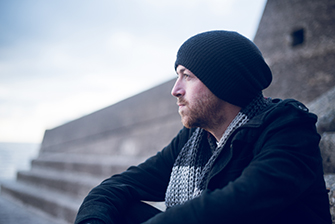Feeling more depression symptoms than usual in the cold months? Seasonal Affective Disorder isn’t just the “Winter Blues” or “Cabin Fever.” It is a clinical depression condition for millions of people that can severely impact their daily lives and mental health. If you or someone you love gets uncharacteristically sad during the fall and winter months, they may be suffering from Seasonal Affective Disorder. Keep reading to learn more about Seasonal Affective Disorder and three ways to cope, including seeking help from a luxury mental health treatment center.
What Is Seasonal Affective Disorder?
According to the National Institute on Mental Health, Seasonal Affective Disorder (also known as SAD) is not considered a separate disorder but is a type of depression characterized by its recurrent seasonal pattern, with symptoms lasting about 4 to 5 months per year. Therefore, the signs and symptoms of SAD include those associated with major depression and some specific symptoms that differ for winter-pattern and summer-pattern SAD. Not every person with SAD will experience all symptoms.
Signs and Symptoms of Seasonal Affective Disorder
Also, according to the National Institute on Mental Health, the signs and symptoms of Seasonal Affective Disorder are as follows:
Symptoms of major depression may include:
- Feeling depressed most of the day, nearly every day
- Losing interest in activities you once enjoyed
- Experiencing changes in appetite or weight
- Having problems with sleep
- Feeling sluggish or agitated
- Having low energy
- Feeling hopeless or worthless
- Having difficulty concentrating
- Having frequent thoughts of death or suicide
For winter-pattern SAD, additional specific symptoms may include:
- Oversleeping (hypersomnia)
- Overeating, particularly with a craving for carbohydrates
- Weight gain
- Social withdrawal (feeling like “hibernating”)
Specific symptoms for summer-pattern SAD may include:
- Trouble sleeping (insomnia)
- Poor appetite, leading to weight loss
- Restlessness and agitation
- Anxiety
- Episodes of violent behavior
Try Light Therapy or Change Your Scenery
One of the ways of treating Seasonal Affective Disorder is through light therapy. Since natural sunlight is diminished during the fall and winter months, the body’s circadian rhythm is thrown off, and more melatonin is being produced than usual. Exposure to light therapy can help balance this out.
In addition to light therapy, changing your scenery can help with SAD. Many individuals become “snowbirds” if they have the means, allowing them to live in warmer, brighter places during the winter months. Consider going on short trips and planning vacations throughout the winter to feel less claustrophobic, you have something to look forward to, and you are exposed to more pleasant weather.
Check In About Your Antidepressants
Since Seasonal Affective Disorder isn’t a standalone condition, It may be possible that you need to change your dosage throughout the fall and winter months if you are already taking antidepressants. Make an appointment with your therapist to talk to them about your symptoms and make adjustments with them as necessary.
In addition to checking in about your antidepressants, many individuals have also found improvements with their SAD symptoms by taking vitamins such as Vitamin D and St. John’s Wort to help improve their mood. Check with your doctor before taking any vitamins.
Cope With Help From Luxury Mental Health Treatment Centers
Living with depression isn’t black or white and, for many people, it takes more help than changing your scenery or adjusting your medication dosages. If you or someone you love are experiencing severe symptoms of Seasonal Affective Disorder, support from a luxury mental health treatment center can get you back on the right track. Talk therapy, holistic therapy, and other therapy treatments are very effective on Seasonal Affective Disorder—especially on the beautiful beaches of Malibu, California.
More About Treatment at The Pointe Malibu Recovery Center
As a luxury mental health treatment center, we can help you through Seasonal Affective Disorder. We will help you cope and help you recognize the signs and symptoms in an effort to prevent it next year.
To comfort you during your healing, we offer discreet, luxurious accommodations. For your added convenience, private quarters are available. Our exquisite residential properties are located in Malibu’s most prestigious beachfront community, with views of the Pacific Ocean, a beautiful place to find peace and begin your recovery. You can also look forward to resort-style grounds and gourmet cuisine prepared daily by our on-staff chefs during your stay.
Our Clinical Director supervises the creation of your treatment plan and ongoing care and only carries a caseload when necessary for the most complex cases. This allows the Clinical Director ample time to work with your specific treatment teams as issues come up. Treatment teams include but are not limited to:
Medical Services:
- Medical Evaluation & Assessment
- Medical Intervention & Continuing Care
- Pain Recovery Management
- Medical Detox
- Medication-Assisted Treatment
- Nutritional Assessment
- Mental Health Diagnostic Assessments
- Alternative Holistic Treatment
Clinical Services:
- Treatment of Co-Occurring/Compulsive Disorders
- Trauma-Focused Treatment
- Individual Therapy
- Family Therapy
- Group Therapy
- Neurofeedback
- Experiential & Holistic Therapies
- Case Management
- Discharge / Continuing Care Planning & Services
- Early Recovery Transition and Lifestyle Planning & Services
Our commitment to privacy is unwavering. In the spirit of compassion, professional ethics, and accordance with HIPAA privacy protections, your recovery time here is known only to those that you wish to include in your inner circle. If you’re ready to start your journey to long-lasting recovery from Seasonal Affective Disorder and depression, we are here for you.





